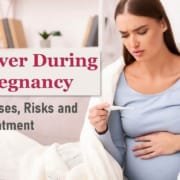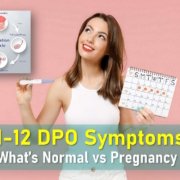Morning Sickness – Nausea and Vomiting in Pregnancy
Nausea and vomiting of pregnancy commonly occur between 5 and 18 weeks of pregnancy. Around 50% to 90% of women experience varying degrees of nausea, with or without vomiting. The severity of these symptoms can vary.“Morning sickness” is the term often used to describe mild nausea and vomiting that many women have during pregnancy. Symptoms can be mild or severe. Despite its name as “morning” sickness, symptoms can occur at any time of the day. In fact, most women who have the condition feel sick all day long. Morning sickness usually gets better after the first few months of pregnancy. While most cases are mild and do not require specific treatment. In severe cases, anti-sickness medication may be recommended to manage symptoms, as dehydration can become a concern. If you suspect dehydration or are struggling with symptoms, it’s advisable to consult a healthcare provider.
Challenges Posed by Morning Sickness
Nausea and vomiting during pregnancy can pose challenges, impacting a woman’s mood, work, relationships, home life, and caregiving responsibilities. Support from family and friends can significantly ease the coping process.
Do all pregnant women get morning sickness nausea and vomiting?
No. But nausea and vomiting of pregnancy is a very common condition. As many as 9 out of 10 pregnant women feel nauseous early in pregnancy. A smaller number actually throw up.
When does nausea and vomiting in pregnancy start?
That depends on the woman and the pregnancy. Symptoms usually start during the first 2 months of pregnancy. Symptoms tend to get worst during the second and third months, with the majority of women experiencing relief around the 4th or 5th month, which is roughly the midpoint of their pregnancy. But some women feel bad for much longer.
What causes morning sickness nausea and vomiting?
The precise cause of morning sickness remains unknown, but it is likely linked to hormonal changes during pregnancy, reduced stomach content movement and psychological factors. Symptoms may be more pronounced in twin and multiple pregnancies. Several factors can increase the likelihood of experiencing nausea and vomiting during pregnancy, such as:
- Carrying a female baby
- Being in the first pregnancy
- A history of nausea and vomiting in previous pregnancies or within the family(mother and sisters)
- Multiple pregnancy (e.g., twins)
- A history of motion sickness or migraines
- Prior experience of nausea when using estrogen-containing medications (such as birth control pills) or suffer from menstrual migraines.
- Obesity
Impact of morning sickness on the Baby
Mild to moderate nausea and vomiting typically do not pose risks to the baby. In fact, these symptoms may indicate the placenta’s proper function and may be associated with lower miscarriage rates compared to women without symptoms. Severe symptoms (hyperemesis gravidarum), if untreated, may increase the risk of preterm labor and low birth weight but do not affect everyone with this condition.
When should I see a doctor for morning sickness?
See your doctor right away if you:
- Experience daily or frequent episodes of vomiting, especially if there is blood in your vomit.
- Are undergoing unexplained weight loss.
- Develop abdominal pain or cramps.
- Suspect you may be experiencing excessive fluid loss, known as dehydration, characterized by reduced urine output, dark yellow urine, or dizziness upon standing.
If you can’t keep anything down, you might need to be given fluids through a tube that is put into one of your veins, called an “IV.” Plus, you might need to get a medicine to prevent nausea and vomiting.
Investigations and Testing
For mild nausea and vomiting during pregnancy, specific tests or investigations are usually unnecessary. However, they may be considered:
- In case of worsening symptoms
- Inability to retain food or fluids
- Weight loss
- When symptoms suggest other underlying issues (e.g., urinary tract infection)
Investigations may include urine tests for ketones and blood tests.
Hyperemesis Gravidarum: A Severe Form
Hyperemesis gravidarum, a rare condition affecting less than 1 in 100 pregnant women, involves prolonged and severe vomiting, resulting in dehydration, weight loss, and potential vitamin deficiencies. In extreme cases, it may lead to a state resembling starvation, detected through urine ketone levels. Hospitalization for intravenous fluids and other treatment may be necessary.
Is there anything I can do on my own to feel better?
Yes. If your symptoms aren’t too serious, you can try:
- Eating as soon as you feel hungry, or even before you feel hungry.
- Snacking often and eating small meals. The best foods to eat have lots of protein or carbohydrates, but not a lot of fat. Good choices are crackers, bread, and low-fat yogurt. You should also avoid spicy foods.
- Drinking cold, clear beverages that are either fizzy or sour. Good choices are ginger ale and lemonade.
- Eating ginger flavored lollipops.
- Smelling fresh lemon, mint, or orange.
- Brushing your teeth immediately after meals.
- Avoiding reclining or lying down immediately after eating.
- Avoiding things that make you feel nauseous. This can involve environments with poor ventilation, potent odors, high temperatures, loud surroundings, or insufficient sleep.
- If you experience aggravated symptoms while taking a prenatal vitamin with iron, consider taking them before bedtime. If your symptoms persist, it’s possible to temporarily discontinue the vitamins. In the event that you suspend your prenatal vitamin intake, ensure you take a supplement containing a minimum of 400 micrograms of folic acid until you reach at least 14 weeks of pregnancy to lower the risk of birth defects.
- There are also bands that you can wear on your wrists called “acupressure” bands. These bands are supposed to reduce morning or motion sickness. Some women feel better if they wear these.
It’s important to note that over-the-counter remedies for nausea and vomiting during pregnancy should be used cautiously, as their safety and effectiveness remain uncertain.
When Are Anti-Sickness Medicines Necessary?
While most pregnant women can manage symptoms without medication, anti-sickness drugs may be recommended in cases of persistent and severe symptoms that do not respond to lifestyle changes. The decision to use medication during pregnancy should involve a discussion between the patient and healthcare provider, weighing the potential benefits against known risks.
Especially for women with hyperemesis gravidarum, the potential benefits of certain anti-sickness medications may outweigh the risks, given their significant impact on the physical and mental well-being of the pregnant woman and the baby’s health.
Note: Medications during pregnancy are typically prescribed only when there is a clear benefit and a reasonable level of safety. Careful consideration of risks and benefits is crucial.
Treatment Options for Nausea and Vomiting in Pregnancy
There are various medications available for the treatment of nausea and vomiting during pregnancy, including:
- Doxylamine and Pyridoxine Combination. It can effectively alleviate symptoms of nausea and vomiting. Notably, it is the only medication licensed specifically for the treatment of pregnancy-related nausea and vomiting in the UK.
- Pyridoxine (Vitamin B6): (10 to 25 mg, taken three times a day) can alleviate mild to moderate nausea symptoms but typically do not provide relief from vomiting.
- Other Initial Options: Medications like promethazine, cyclizine, prochlorperazine, or chlorpromazine are often considered as initial treatment choices.
- Secondary Options: When primary options prove ineffective, medications such as metoclopramide, domperidone, or ondansetron may be considered. It’s crucial to note that these come with additional risks. For instance, metoclopramide should be used for a maximum of five days due to potential nerve and movement problems. Domperidone should be used for a maximum of seven days to avoid potential heart rhythm issues, and ondansetron has been associated with a slight risk of cleft lip and cleft palate in the baby, as well as possible heart problems.
- Steroid Medications: In severe cases of hyperemesis gravidarum where other treatments are unsuccessful, obstetric specialists in a hospital setting may administer steroid medications.
In cases where medication is necessary, the goal is to utilize the lowest effective dosage for the shortest duration possible. However, some women may require medication for an extended period.
It’s important to note that aside from Doxylamine and Pyridoxine Combination (Xonvea)®, none of the drugs mentioned above have specific pregnancy licenses in the UK. Manufacturers typically advise caution or recommend against their use during pregnancy. However, medical experience and research have established their safety and acceptability as treatment options if required.
Inadequate Response to Initial Treatments and treatment of hyper emesis gravidarum
In some severe cases, hospital care becomes necessary, primarily to provide fluids intravenously. Hospitalization may be warranted when initial oral medications are ineffective or cannot be retained. Women may require admission to the hospital if they experience severe illness, significant weight loss, or dehydration.
Hospitals may administer anti-sickness medication through injections or intravenous drips, offering an alternative for individuals unable to tolerate oral tablets. Drip-administered vitamins may be provided to women with severe symptoms to combat starvation.
In rare instances, feeding through a stomach tube or intravenous drip may be considered. Medications like steroids are typically administered under the guidance of an obstetric specialist within a hospital setting.
If you find yourself in this situation, you should receive comprehensive treatment to control your symptoms. Seeking a second opinion is advisable if you feel your treatment is inadequate.
Can morning sickness nausea and vomiting be prevented?
There is no perfect way to completely prevent morning sickness – nausea and vomiting, however its symptoms can be controlled. Doctors urge all women who might get pregnant and who are pregnant to take vitamins. The vitamin should include 400 micrograms of folic acid. Taking vitamins prior to conception and during the early stages of pregnancy could potentially reduce the occurrence of nausea and vomiting.
Other Potential Causes of Vomiting
It’s important to remember that vomiting is not always pregnancy-related and can result from other underlying issues. Pregnant women can still be susceptible to other illnesses, such as urinary tract infections. If you experience concerning symptoms, including dark urine, severe abdominal pain, fever, painful urination, headache, diarrhea, jaundice, extreme weakness, blood in vomit, or relentless vomiting, it is crucial to promptly contact a healthcare provider.










